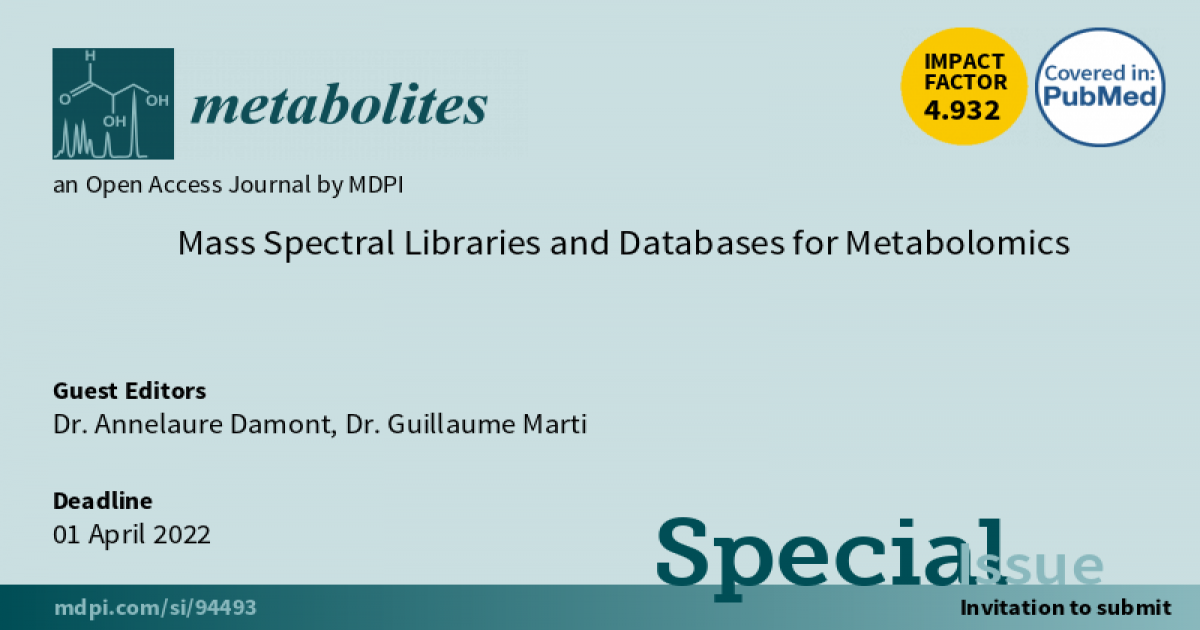Mass Spectral Libraries and Databases for Metabolomics
A special issue of Metabolites (ISSN 2218-1989). This special issue belongs to the section "Bioinformatics and Data Analysis".
Deadline for manuscript submissions: closed (15 July 2022)

Special Issue Editors
Interests: metabolomics; mass spectrometry; structural elucidation; organic analysis; isotope-assisted research
Special Issue Information
Dear Colleagues,
No matter the context (medical, toxicological, nutritional, environmental, etc.), metabolomics is currently facing an explosion in the amount of data generated from a single sample, especially when using mass spectrometry (MS)-based approaches. Driven by a desire to gain maximum knowledge about the organic content of a sample, metabolomic studies increasingly include untargeted tandem mass spectrometry protocols (such as data-dependent or -independent acquisitions) in their data acquisition workflows, and call upon diverse and complementary MS-based platforms (LC-MS, GC-MS, Ion Mobility Spectroscopy (IMS)-MS, etc.), generating data and metadata as complex as they are varied. In this context, mass spectral libraries and databases are of primary importance, both for data storage and management, but also to ensure reliable identification and shareable annotation of metabolites (including lipids and exposures) and facilitate the exploration of a large part of the metabolome that remains unknown or incompletely characterized.
This Special Issue of Metabolites, dedicated to “Mass Spectral Libraries and Databases for Metabolomics”, will cover various aspects ranging from spectral data collection and repository management to practical applications. Relevant contributions dealing with the (non-exhaustive) following topics are welcome: prerequisites (including QA/QC) for high-quality and FAIR (findable, accessible, interoperable, and reproducible) spectral data acquisition, data processing pipelines for building MS(/MS) libraries either from authentic standards or biological samples, database management systems, data import/export, spectral library enrichment with orthogonal information (e.g., collision cross-section), curation and product ion annotation strategies, spectral library-based molecular networking and unknown compound structural elucidation, in silico-generated MS/MS libraries. Manuscripts dealing with any other related issues are also warmly welcomed.
Dr. Annelaure Damont
Dr. Guillaume Marti
Guest Editors
Manuscript Submission Information
Manuscripts should be submitted online at www.mdpi.com by registering and logging in to this website. Once you are registered, click here to go to the submission form. Manuscripts can be submitted until the deadline. All submissions that pass pre-check are peer-reviewed. Accepted papers will be published continuously in the journal (as soon as accepted) and will be listed together on the special issue website. Research articles, review articles as well as short communications are invited. For planned papers, a title and short abstract (about 250 words) can be sent to the Editorial Office for assessment.
Submitted manuscripts should not have been published previously, nor be under consideration for publication elsewhere (except conference proceedings papers). All manuscripts are thoroughly refereed through a single-blind peer-review process. A guide for authors and other relevant information for submission of manuscripts is available on the Instructions for Authors page. Metabolites is an international peer-reviewed open access monthly journal published by MDPI.
Please visit the Instructions for Authors page before submitting a manuscript. The Article Processing Charge (APC) for publication in this open access journal is 2700 CHF (Swiss Francs). Submitted papers should be well formatted and use good English. Authors may use MDPI's English editing service prior to publication or during author revisions.
Dr. Annelaure Damont
Dr. Guillaume Marti
Guest Editors
Manuscript Submission Information
Manuscripts should be submitted online at www.mdpi.com by registering and logging in to this website. Once you are registered, click here to go to the submission form. Manuscripts can be submitted until the deadline. All submissions that pass pre-check are peer-reviewed. Accepted papers will be published continuously in the journal (as soon as accepted) and will be listed together on the special issue website. Research articles, review articles as well as short communications are invited. For planned papers, a title and short abstract (about 250 words) can be sent to the Editorial Office for assessment.
Submitted manuscripts should not have been published previously, nor be under consideration for publication elsewhere (except conference proceedings papers). All manuscripts are thoroughly refereed through a single-blind peer-review process. A guide for authors and other relevant information for submission of manuscripts is available on the Instructions for Authors page. Metabolites is an international peer-reviewed open access monthly journal published by MDPI.
Please visit the Instructions for Authors page before submitting a manuscript. The Article Processing Charge (APC) for publication in this open access journal is 2700 CHF (Swiss Francs). Submitted papers should be well formatted and use good English. Authors may use MDPI's English editing service prior to publication or during author revisions.
Keywords
- metabolomics
- mass spectrometry
- databases
- library search
- spectral data collection
- high quality spectra
- tandem mass spectra
- fragmentation
- reference compounds
- matching
- annotation
- identification
- molecular networking
Benefits of Publishing in a Special Issue
- Ease of navigation: Grouping papers by topic helps scholars navigate broad scope journals more efficiently.
- Greater discoverability: Special Issues support the reach and impact of scientific research. Articles in Special Issues are more discoverable and cited more frequently.
- Expansion of research network: Special Issues facilitate connections among authors, fostering scientific collaborations.
- External promotion: Articles in Special Issues are often promoted through the journal's social media, increasing their visibility.
- Reprint: MDPI Books provides the opportunity to republish successful Special Issues in book format, both online and in print.
Further information on MDPI's Special Issue policies can be found here.







